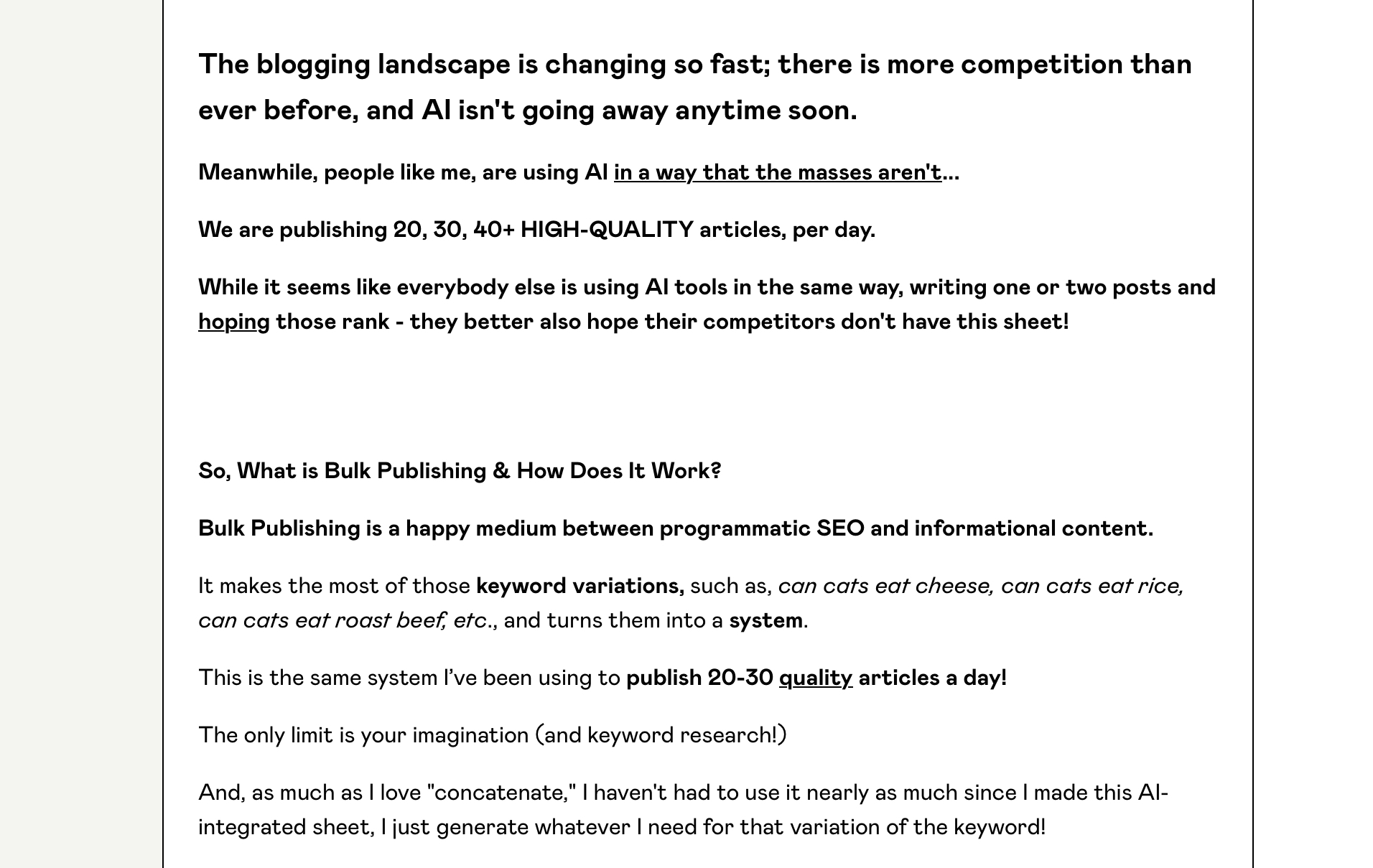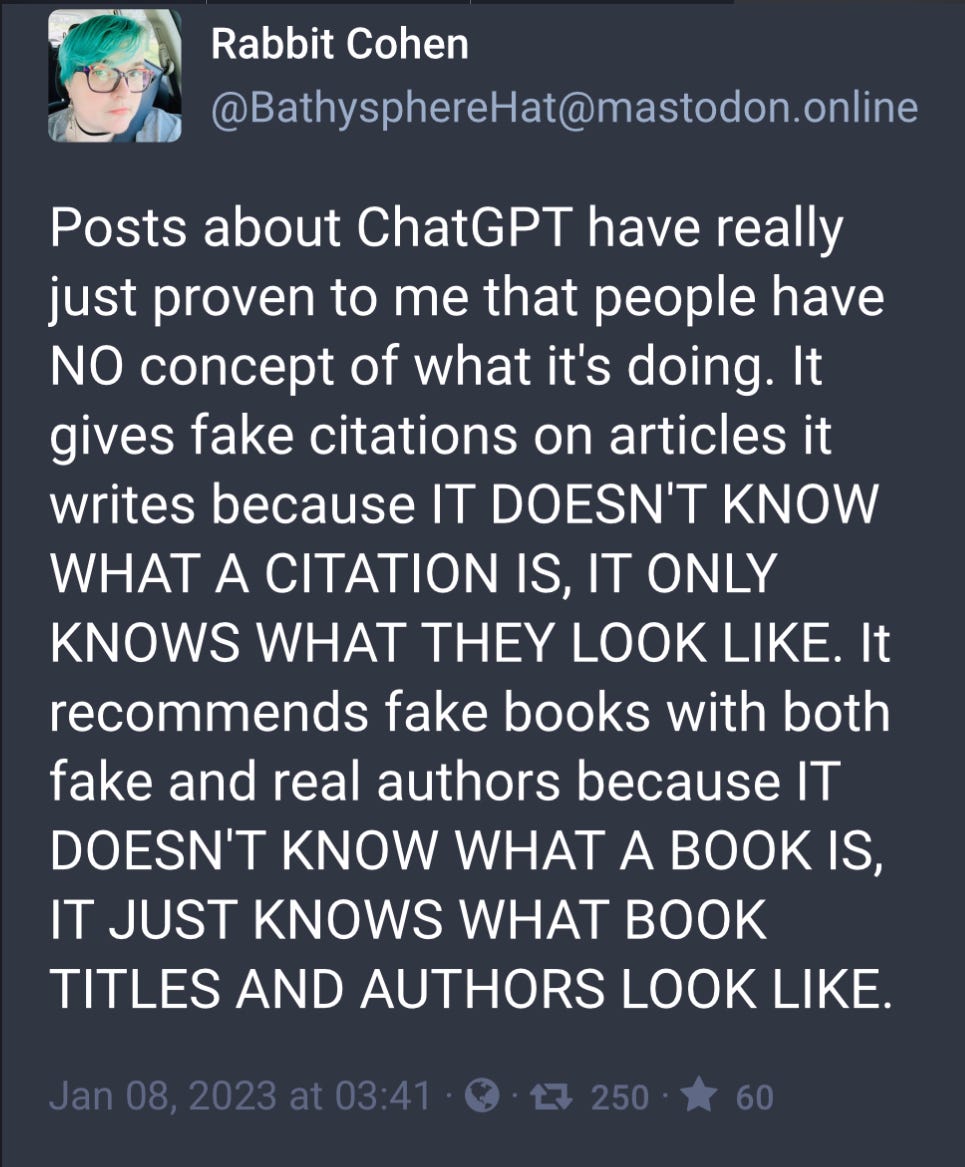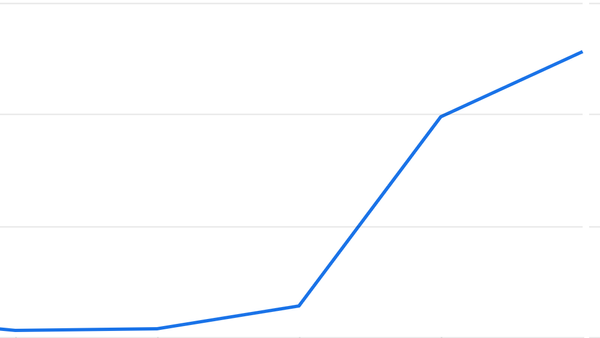AI Writing Tools Won't Save You from Creating Content
Why I don't buy into the hype around ChatGPT.

I hate the hype around ChatGPT.
Whenever the topic of AI writing tools comes up, I’ve noticed that proponents of AI tend to group everyone else into two camps:
- Haters and technology Luddites.
- Fellow fans and avid users.
I don't think I fit into either group.
I've been enthusiastically playing with every AI tool that I can get my hands on (Jasper, Copy.ai. ChatGPT, Stable Diffusion, Dall-E, Canva's existing AI image generator, etc.). On the other hand, I don't agree that these tools will change the world or professional work anywhere close to the scale that most coverage describes.
This isn't a matter of professional pride.
I would love for these tools to take on the repetitive marketing tasks that I currently find mind-bogglingly boring. But… we aren't there yet. And I don't think we will get there anytime soon (no point in speculating on the distant future and things we cannot predict).
The Problems with AI Writing Tools
There are three key problems with all of these GPT-based AI tools:
- Pattern matching algorithms, by definition, can never create anything new
- Focusing on quantity, instead of quality, of content is a race to the bottom.
- AI tools lie. A lot.
Let's take a closer look.
Point 1: Current AI technology is simply matching patterns and cannot create anything new.
As described in this academic paper by Emily M. Bender, Timnit Gebru, Angelina McMillan-Major and "Shmargaret Shmitchell", a language model (like GPT-3) is:
"a system for haphazardly stitching together sequences of linguistic forms it has observed in its vast training data, according to probabilistic information about how they combine, but without any reference to meaning: a stochastic parrot."
Basically, AI looks at a big set of data and notices when certain characteristics (words, visuals, etc.) tend to appear together. It's operating on correlation without any concept of meaning.
AI’s "parroting" isn't the same as human creativity.
Humans think with intention and can contextualize the information that they are exposed to. These AI models can't do that. As they get better, they might have bigger datasets or gain the ability to "remember" more words, but even taken to an extreme, this technology will never understand meaning.
You might ask why these nuances are important for marketers who are just trying to build a meta description or a blog outline. And for some use cases, basic pattern matching is enough.
But what if you want to create something off the beaten path? Perhaps you’d like to write on a new industry development or disagree with typical advice… Yet when you plug those prompts into your favorite AI tool, the quality of its output quickly deteriorates.
I used to work as a writing instructor in college. My students, all incredibly smart and talented individuals at a very selective school, were terrible at writing essays! I was constantly asking my students "so what?" and pushing them to actually articulate their opinions.
If I learned anything from those 200+ hours of teaching writing it would be this: when you push a human writer to articulate why they think the way they do, that’s when the real magic happens. AI can never capture even a tiny speck of that elusive fairy dust, because AI cannot have a motive behind its writing.
It's not enough to simply repeat what others have already said before you. Good writing does at least some of the following:
- Adds something new
- Contributes a unique perspective
- Introduces a different point of comparison
- Analyzes past information using a new framework.
Good content marketing is a lot like good academic writing. If you want your post to get attention, you need to do something that your competitors haven't.
If everyone has already written about the same tactics for building an SEO strategy, your post with those claims won't actually help or inform any readers.
Why would someone read your dull, unoriginal post instead of somebody else's?
Point 2: Quantity of content is a race to the bottom.
When you measure marketing success based on quantity of output, you will never see good business results.
There are few reasons for any company to publish 20+ blog posts a month, and for smaller teams, the amount of content they can produce without sacrificing quality is much lower.
Sooner or later, a company pumping out too much content will either run out of unique ideas or their writers will burn out and begin producing generic garbage.
Don't believe me? Look at this response to one of my threads on Mastodon from Thomas Katterton Williams :
"You’re right about quantity being a loser long-term. I worked at a content mill/agency in 2013 and writers were expected to churn out 4000 words per day. Most burned out quickly and really, how many ‘The 7 best features of VoIP for your SMB’ posts can anyone read?
And naturally, it always felt tense having to pitch these agency clients the same ideas month after month. Lots of reaches and even pop culture references that quickly got dated."
Now let's see how much worse a focus on raw output can get when AI enters the picture.
Ross Simmonds recently published a blog post in praise of AI (which this essay was actually originally written in response to). I was particularly struck by Ross's praise of this ChatGPT-based "Bulk Publishing System" by Arielle Phoenix.
This is the part in her product description that I found a little disturbing:

Let's imagine that all content marketers follow Arielle's lead and begin posting "over 1000 articles" at a pace of "40+ HIGH-QUALITY articles, per day".
If 10 CRM companies publish 40 blogs a day for 1 year, that's 146,000 blog posts. How many unique topics can these companies possibly cover? We would probably end up with 10,000+ pieces on how CRM software can help businesses "improve retention" and "consolidate interactions".
Who will read these? What purpose can these posts possibly serve?
Even if those articles somehow continue to rank well on Google Search, why would any human reader actually click on any particular one?
You basically end up playing roulette with all of your other competitors, praying that you will get ahead based on nothing besides pure chance. At best, you're competing for the best keyword-stuffing (where “best” gets defined based on whatever the current algorithm thinks, not what your human audience might like).
I already tell my clients and prospects that they are trying to publish too much content more often than not. When you take this tendency to the scale that AI-generated content can provide, the pool of mediocre content becomes an ocean.
Point 3: AI Writing Tools Will Lie To You. A Lot.
Now, even if you disagree with me that quantity of content is a flawed goal, and aren't concerned with the philosophical implications of imitating meaning, you should pay attention to this part.
AI cannot understand what it's talking about, so it will make up facts and lie to you.
This Mastodon post expressed the same sentiment quite well:

Whenever I've played with any AI writing tools, I've seen this first-hand. Even when I don't ask the AI to produce brand-new information but only ask it to rewrite or summarize my own notes, the AI continues to misunderstand and misquote my claims.
The most insidious part of these frequent inaccuracies is their appearance of truth. ChatGPT's writing seems believable. It gets things right about 80% of the time on most topics. But what happens with the other 20%?
Janet Haven expressed the same worry in "ChatGPT and the future of trust":
"But while its output is entertaining, sometimes funny, and fluent — convincingly so — it is also unreliable, generating responses that can be spectacularly wrong. In an information environment in which trust is extremely low and mis- and disinformation are rampant, ChatGPT’s parlor trick of human mimicry pours gas on an already flaming dumpster fire."
It's easy to let your guard down and stop cross-referencing every single statement the algorithm spits out at you. But the second you trust those answers, you might be in trouble.
What Now?
I'd like to leave you with a quote from the wonderful essay "The Expanding Dark Forest and Generative AI" by Maggie Appleton:
"You thought the first page of Google was bunk before? You haven't seen Google where SEO optimizer bros pump out billions of perfectly coherent but predictably dull informational articles for every longtail keyword combination under the sun."
Don't let the AI blind you. Your marketing work will still need a human touch, as much as you'd like to believe otherwise.





